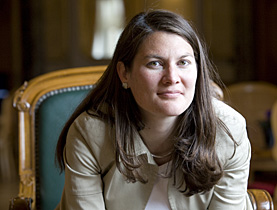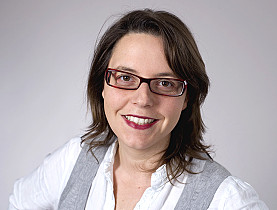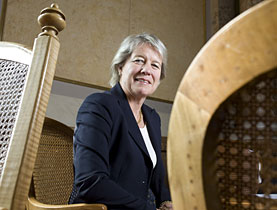Adding emotion and a green touch to parliament

She has strong personal principles, represents a small party and juggles a job and a political mandate - and soon also a young family.
Tiana Moser says she is fascinated by Switzerland’s democratic system, but just as often she feels frustrated by proceedings in parliament.
“I want to be convinced that I made the right decision in every vote. It is very ambitious and actually it’s not always possible to achieve this goal,” says Moser with a disarming smile.
The 30-year old political scientist was elected to the House of Representatives for the Liberal Green Party in canton Zurich more than 18 months ago.
Politics is an emotional business for her. It does not go unnoticed that she comments during debates, gesturing to her colleagues sitting nearby in the chamber.
“It gets to me to see things not going the way I want them to go,” she admits. But what is really exasperating for her is to see seemingly random decisions cancelling out hard fought compromises.
“Sometimes it takes just one or two parliamentarians to be absent from the chamber during a crucial vote and a well-balanced solution is off the table.”
The notoriously slow pace of parliamentary work is one thing, she says. But in reality the two-chamber system can also help balance out blatant arbitrariness and has its advantages.
“It might sound a bit melodramatic but it is interesting to see how people with their different views and values cooperate and aim to find the best possible solution to a problem of this country.”
She points out the considerable diversity in the Swiss parliament with its system of semi-professional, part-time politicians.
Political base
Moser was in her mid-twenties when she joined a political party – the newly founded Green Liberals.
They stand for environmental values and for individual responsibility, her very ideals.
“The Greens want to give too much importance to social issues and state intervention, while the Radicals, notably their Zurich chapter, has no real environmental understanding.”
With her small party, she appears to have bridged the two political worlds.
It was a steep learning curve for Moser who – unlike many of her colleagues – had no previous experience in a local or cantonal parliament.
But she has never considered it a disadvantage. Neither did she feel intimated by the new world she has entered and her mandate.
“I have no history and I have no problem mixing with parliamentarians from other parties.” Her perception is confirmed by colleagues from other groups.
Moser says a post in a local or cantonal government could be an option one day, but for the time being she prefers to focus on her term in Bern.
Politics, job and family
Moser says she has no reason to criticise the current system of parliamentary allowances: “It is sufficient.” Members receive an average of SFr130,000 ($122,000) per year, according to a survey published in the wake of a recent funding scandal in Britain.
But she points out it is often more than a part-time commitment. Some days begin with a working breakfast at seven in the morning and end with an event at 10pm. “There is a certain flexibility I don’t have to attend every lunch or evening lobby event,” she hastens to add.
Moser says much of the groundwork for a parliamentary session is done throughout the year also as part of committee meetings. She plans her speeches as well as other detail preparations from day to day or over the long weekends.
The Swiss parliament as a rule sits four times a year for three weeks each, from Monday afternoon to Thursday evening. In addition there are committee meetings and party conferences.
“The workload can take a fair bit of time, but sometimes I also get it done fairly quickly.”
She takes a very pragmatic approach when she is asked how easy it is to combine the jobs of research fellow and politician – and soon also that of motherhood.
“I will try to manage the triple role with flexibility and the help of my husband and my family. It has to be possible in our society to be a mother and to have a career.”
She adds that she will have to reduce her hours a bit and “maybe have some of the party meetings at home”.

More
House of Representatives
The name
One last personal question before she gets up from the chair to attend a meeting. Where is her first name from? Tiana is not very common in Switzerland.
“People often ask me whether I have Spanish or Italian roots, which is not the case.
“I’m not sure, Tiana could be a short form of Christiana. My parents initially wanted to call me Angelina, but didn’t like the thought that I would sooner or later get nicknamed Angie,” she smiles.
Instead, in official documents she has become Tiana Angelina Moser.
Urs Geiser, swissinfo.ch
Moser was 28 when she was elected to the House of Representatives in 2007 in her Zurich constituency.
It is her first parliamentary mandate.
Trained as a political scientist and environmental specialist, Moser is a research fellow at Zurich’s Federal Institute of Technology.
Moser is one of three Liberal Greens in the 200-strong House of Representatives. The party has one seat in the 26-member Senate.
A first cantonal chapter of the party was founded in Zurich in 2005 before a national organisation was set up two years later. There are presently 12 cantonal groups mainly in the German-speaking part of the country.
The party claims liberal and environmental values and forms a group in parliament with the centre-right Christian Democrats and the Protestant Party.
Parliament would benefit from the presence of expatriates, according to Moser.
She is open to the idea of a seat for Swiss abroad although the details would have to be examined, she says.
Moser has lived in Spain, Scotland and Germany and does not rule out moving abroad at a later stage in her life.

In compliance with the JTI standards
More: SWI swissinfo.ch certified by the Journalism Trust Initiative





You can find an overview of ongoing debates with our journalists here. Please join us!
If you want to start a conversation about a topic raised in this article or want to report factual errors, email us at english@swissinfo.ch.